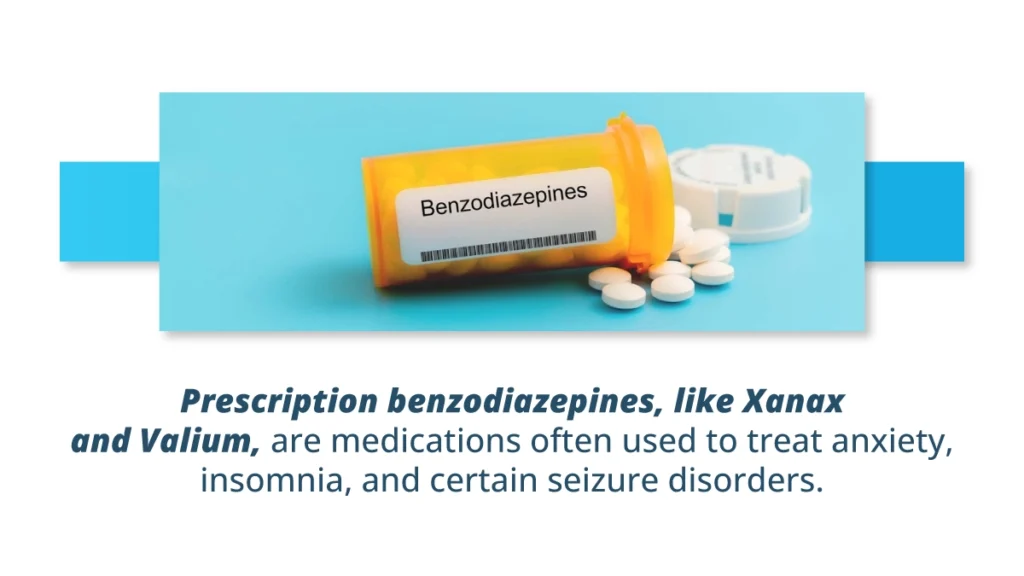Benzodiazepines are a class of psychoactive drugs commonly prescribed for their sedative, hypnotic, anxiolytic, and muscle-relaxant properties. Widely used in medical settings, these medications primarily target the central nervous system to alleviate symptoms associated with anxiety, panic disorders, insomnia, and muscle spasms.
While effective in managing various conditions, their use is not without controversy due to potential side effects, risk of dependence, and withdrawal issues. Understanding the intended applications and risks associated with benzodiazepines is crucial for both healthcare professionals and individuals seeking treatment.
Key Takeaways
“Benzo” is a colloquial term often used to refer to benzodiazepines, which are a class of psychoactive drugs. Here’s what you need to know:
- Benzos are commonly prescribed for anxiety and panic disorders due to their calming effects on the central nervous system.
- These medications are also used to treat insomnia by promoting sleep and relaxation.
- The use of benzos requires careful monitoring due to the potential for dependence and withdrawal symptoms.
Contact The Haven Detox-South Florida at (561) 328 – 8627 for more information and personalized recovery support to embrace long-term healing.

What are Benzos
Benzodiazepines, generally known as benzos, exert a calming effect on the central nervous system. They are most commonly prescribed medications prescribed to treat anxiety, insomnia, and certain seizure disorders.
Benzos increases the activity of a neurotransmitter called gamma-aminobutyric acid (GABA), which inhibits brain activity, resulting in a sedative and relaxing effect. While effective in managing symptoms, benzos come with risks and the potential for dependence and addiction.
However, Long-term use of benzodiazepines is not without risks, as prolonged usage can result in tolerance, dependence, and withdrawal symptoms. Due to these concerns, healthcare professionals carefully consider the potential benefits and drawbacks when prescribing benzos, often opting for short-term use and exploring alternative treatments when appropriate.
Common Medical Uses of Benzodiazepines
Benzodiazepines have a central nervous system depressant effect. Benzodiazepines have various medical uses.
Some of them are listed below:
Anxiety Disorders
Benzodiazepines are often prescribed for the short-term management of anxiety disorders. They can help alleviate symptoms of excessive worry, tension, and restlessness. However, they are generally not advised for long-term usage due to the risk of dependence and tolerance.
Insomnia
Some benzodiazepines, such as temazepam and triazolam, are used to treat insomnia by inducing sleep and reducing the time it takes to fall asleep. Again, they are typically prescribed for short-term use to avoid dependence issues.
Seizure Disorders
Benzodiazepines can be used as anticonvulsants to control seizures. In emergencies, intravenous administration of drugs like diazepam or lorazepam may be used to stop prolonged or severe seizures quickly.
Muscle Spasms
Benzodiazepines with muscle relaxant properties, such as diazepam, can be prescribed to reduce muscle spasms and stiffness.
Alcohol Withdrawal
Benzodiazepines are sometimes used in the treatment of alcohol withdrawal to manage symptoms such as anxiety, tremors, and seizures. They can help prevent serious complications associated with alcohol withdrawal.
Sedation Before Medical Procedures
Benzodiazepines may be used to induce sedation or amnesia before certain medical procedures or surgeries.
Types of Benzos
Benzodiazepines play a crucial role in the management of various neurological and psychological conditions. Let’s explore some common types of benzodiazepines, each with its unique characteristics and medical applications.
Alprazolam (Xanax)
Alprazolam, known by its brand name Xanax, belongs to the benzodiazepine class of medications. It is primarily prescribed to manage anxiety disorders, panic attacks, and certain types of depression.
Due to its immediate effect, Xanax is often prescribed for short-term relief of acute anxiety symptoms. However, it should be used cautiously and under close medical supervision, as it has the potential for dependence and withdrawal symptoms.
Diazepam (Valium)
Diazepam, sold under the brand name Valium, is a versatile benzodiazepine with various applications. It is commonly prescribed to treat anxiety, muscle spasms, seizures, and alcohol withdrawal symptoms.
Its muscle relaxant properties are useful for conditions involving muscle tension or spasms. While effective, Valium also carries the risk of dependence and should be used cautiously, especially for prolonged periods.
Clonazepam (Klonopin)
Clonazepam, marketed as Klonopin, is a benzodiazepine primarily prescribed for managing seizure disorders and panic disorder. It works by modulating the effects of GABA, which helps reduce abnormal electrical activity in the brain associated with seizures.
Additionally, Klonopin’s anxiolytic properties make it useful in the treatment of panic attacks. Due to its longer half-life compared to some other benzodiazepines, clonazepam is often taken less frequently, but people should be aware of the potential for tolerance and dependence.
Lorazepam (Ativan)
Lorazepam, commonly known as Ativan, is a benzodiazepine used to treat anxiety disorder, insomnia, and acute seizures. Its quick onset of action makes it suitable for managing acute episodes of anxiety or seizures.
However, like other benzodiazepine receptors, Ativan should be used cautiously, especially in older adults, as it may increase the risk of falls and cognitive decline. Long-term use should be avoided due to the potential for dependence.
Chlordiazepoxide (Librium)
Chlordiazepoxide, when sold under the brand name Librium, is called benzodiazepine prescribed for anxiety disorders and alcohol withdrawal. Librium is often used in the management of alcohol withdrawal symptoms due to its ability to prevent seizures and alleviate anxiety associated with cessation.
However, caution is advised when using chlordiazepoxide, as it might lead to dependence and withdrawal symptoms, especially if used for extended periods. Regular monitoring and gradual dose reduction are essential aspects of safe drug use.
Risks and Side Effects of Benzodiazepine Use
Benzodiazepines, while effective in managing various mental health conditions, come with a range of potential risks and adverse effects that warrant careful consideration. Understanding the following risks is crucial for informed decision-making in their use.
Cognitive Impairment
Benzodiazepines can cause cognitive impairment, affecting memory, attention, and psychomotor skills. This is particularly notable in older adults, who may experience increased confusion and an elevated risk of falls.
It’s essential to balance the potential benefits of benzodiazepines with the cognitive effects, especially in individuals with pre-existing cognitive conditions.
Impact on Mental Health
Prolonged use of benzodiazepines has been linked with potential negative impacts on mental health, including an increased risk of depression.
While these medications can offer relief from acute symptoms of anxiety, ongoing and indiscriminate use may contribute to a cycle of dependency and worsen the underlying mental health conditions.
Paradoxical Reactions
In some cases, rather than inducing calmness, long-acting benzodiazepines can lead to paradoxical reactions, resulting in increased anxiety, aggression, or disinhibition.
These unexpected responses may be more prevalent in certain populations, such as children or older adults, and necessitate immediate medical attention and reconsideration of the treatment plan.
Risk of Overdose
The sedative effects of street benzos can be intensified when consumed with other substances that affect the central nervous system, such as alcohol or opioids. This interaction increases the risk of overdose, which can manifest as respiratory depression, loss of consciousness, or, in extreme cases, fatality.
Healthcare providers must carefully examine the potential risks when prescribing benzodiazepines, particularly in patients with a history of substance misuse.
Dependency and Withdrawal
One of the primary concerns associated with Benzo medicines is the risk of developing dependence. Even when used as prescribed, young adults may develop a tolerance, requiring higher doses for the same effect.
Abrupt cessation or rapid dose reduction can lead to withdrawal symptoms, ranging from increased anxiety and insomnia to more severe complications such as seizures.
Signs and Symptoms of Benzo Addiction
Benzodiazepines are often advised for anxiety and sleep disorders and can lead to addiction when not used as directed. Identifying the signs and symptoms of benzo addiction is crucial for early intervention.
Physical Symptoms
Physical symptoms of benzodiazepine addiction often manifest gradually, affecting various bodily functions.
- Muscle weakness and fatigue
- Tremors or shaky movements
- Dizziness and impaired coordination
- Slurred speech
- Gastrointestinal issues (nausea, constipation)
Psychological Symptoms
Benzodiazepine addiction can impact mental well-being, causing changes in cognition and emotional stability.
- Memory impairment
- Difficulty concentrating
- Mood swings and irritability
- Increased anxiety or panic attacks
- Depersonalization or feeling detached from reality
Behavioral Symptoms
Behavioral changes are common in individuals struggling with Benzo addiction, affecting daily activities and relationships.
- Social withdrawal and isolation
- Neglect of responsibilities at work or home
- Changes in sleep patterns
- Seeking multiple prescriptions or obtaining benzos illegally
- Continued use despite negative consequences
If you or someone you know exhibits these symptoms, contact a healthcare professional for a comprehensive assessment and treatment plan.
Frequently Asked Questions (FAQ)
What are benzodiazepines commonly prescribed for?
Benzodiazepines are typically prescribed to manage anxiety disorders, panic attacks, and insomnia. They act as central nervous system depressants, increasing the calming effects of a neurotransmitter called gamma-aminobutyric acid (GABA).
What are the three types of benzos?
The three main types of benzodiazepines are short-acting, intermediate-acting, and long-acting. Short-acting benzos, like alprazolam, have a rapid onset but shorter duration. Intermediate-acting ones, such as lorazepam, offer a balanced onset and duration.
Long-acting benzos, like diazepam, have a slower onset but a prolonged effect.
What are the side effects of benzodiazepines?
Benzodiazepines may cause drowsiness, dizziness, and impaired coordination. Common side effects include confusion, decreased breast milk, memory issues, and blurred vision. Long-term use can lead to physical dependence and stronger withdrawal symptoms upon discontinuation.
Additionally, benzodiazepines may impact cognitive function and increase the risk of falls, especially in older individuals. Seeking support from doctors can help you recover from depressant drugs.
Transform Your Tomorrow With The Haven Detox-South Florida
Embark on your journey to triumph over benzodiazepine addiction with The Haven Detox-South Florida.
We understand the complexities of benzodiazepine dependency, and our expert team is committed to guiding you toward a healthier, drug-free life. Our comprehensive detox and residential treatment program provides a supportive environment for your recovery.
In addition, our innovative SMART Recovery approach empowers you with practical tools and support for a successful rehabilitation journey.
Contact us at (561) 328 – 8627 now and embrace a life of renewed hope and vitality.







